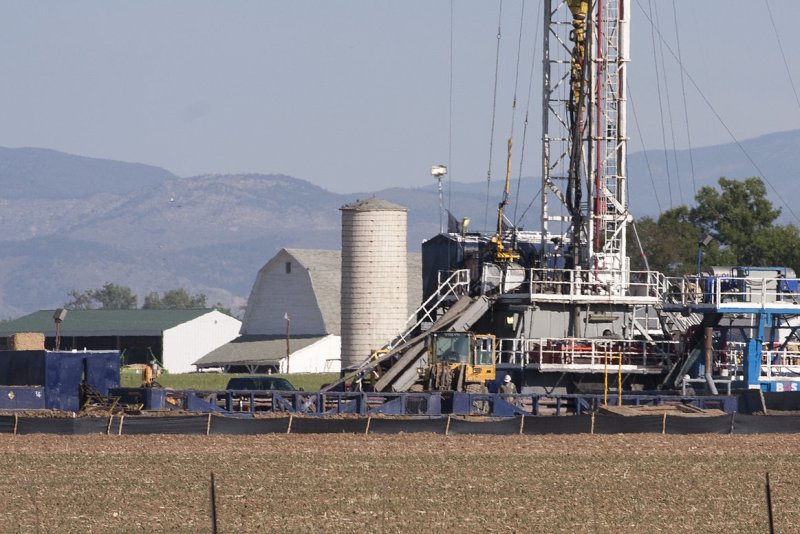By HealthDay News

A fracking drilling site operates in close proximity to a farm at the Niobrara oil shale formation in Weld County, Colorado, on May 30, 2012.
File Photo by Gary C. Caskey/UPI | License Photo
Older people who live near or downwind of fracking sites have an increased risk of premature death, likely due to airborne contaminants from the sites, according to a new study.
"There is an urgent need to understand the causal link between living near or downwind of [unconventional oil and gas development] and adverse health effects," said study co-author Francesca Dominici. She is co-director of the Data Science Initiative at Harvard T.H. Chan School of Public Health, in Boston.
For the study, the researchers analyzed data on more than 15 million Medicare beneficiaries who lived in all major U.S. fracking exploration regions between 2001 and 2015.
Those who lived closest to fracking sites had a 2.5% higher risk of premature death than those who didn't live close to such sites -- a statistically significant difference, the study authors noted in a school news release.
The Harvard team also found that people who lived near or downwind of unconventional oil and gas development (UOGD) sites had a higher risk of premature death than those living upwind.
The findings were published Thursday in the journal Nature Energy.
"Our findings suggest the importance of considering the potential health dangers of situating UOGD near or upwind of people's homes," said lead author Longxiang Li, a postdoctoral fellow in the department of environmental health.
Senior author Petros Koutrakis, a professor of environmental sciences, noted that while UOGD is a major industrial activity in the United States, "very little is known about its public health effects."
Koutrakis said the new study is the first to link death rates to exposure to UOGD-related air pollutants.
About 17.6 million Americans live within 6/10 of a mile of at least one active fracking site.
Older people who live near or downwind of fracking sites have an increased risk of premature death, likely due to airborne contaminants from the sites, according to a new study.
"There is an urgent need to understand the causal link between living near or downwind of [unconventional oil and gas development] and adverse health effects," said study co-author Francesca Dominici. She is co-director of the Data Science Initiative at Harvard T.H. Chan School of Public Health, in Boston.
For the study, the researchers analyzed data on more than 15 million Medicare beneficiaries who lived in all major U.S. fracking exploration regions between 2001 and 2015.
Those who lived closest to fracking sites had a 2.5% higher risk of premature death than those who didn't live close to such sites -- a statistically significant difference, the study authors noted in a school news release.
The Harvard team also found that people who lived near or downwind of unconventional oil and gas development (UOGD) sites had a higher risk of premature death than those living upwind.
The findings were published Thursday in the journal Nature Energy.
"Our findings suggest the importance of considering the potential health dangers of situating UOGD near or upwind of people's homes," said lead author Longxiang Li, a postdoctoral fellow in the department of environmental health.
Senior author Petros Koutrakis, a professor of environmental sciences, noted that while UOGD is a major industrial activity in the United States, "very little is known about its public health effects."
Koutrakis said the new study is the first to link death rates to exposure to UOGD-related air pollutants.
About 17.6 million Americans live within 6/10 of a mile of at least one active fracking site.
Previous research has linked fracking to increased human exposure to harmful substances in the air and water. It has also linked exposure to fracking with pregnancy, lung, heart and cancer risks.
But little was known about whether fracking was associated with increased risk of premature death in seniors, or how it might increase that risk.
More information
For more about fracking and health, visit the U.S. National Institute of Environmental Health Sciences.
Copyright © 2021 HealthDay. All rights reserved.

No comments:
Post a Comment